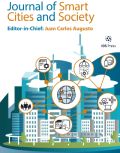There are already various “smart” areas of technology quite consolidated and making their way into business and society. These smarter systems are supported by various areas in computer science, for example sensor networks and context-aware software, which facilitate delivering more specific services to humans in more specific daily life contexts and are better aligned to their individual preferences. This has not been a sudden revolution, but rather another stage in technological evolution. With areas such as artificial intelligence maturing and basic infrastructures including increasingly capable communication networks looming in the technical horizon there are strong signals that this trend will only continue. Then it seems quite a natural progression for society in general, and for our technical communities as well, to move from the various current “smart” silos, such as smart homes, smart cars, smart transportation, smart food grow, smart health, to be interconnected through an overall area which focuses on the multiple combinations and on their cooperation to achieve benefits for society none of those single areas can achieve in isolation.
Hence there are strong motivations for their emergence and consolidation and on the other hand given the combination and complexity of resources required is a topic which will require a long and patient discussion. Design, experimentation, community involvement, cultural adaptations into different parts of the planet, and much more will be required to create services which work effectively in the real world.
Another interesting facet of this area is that it is essentially a multi-disciplinary endeavour. Technology acts in this area as a bonding element as for each of the services which it underpins, so many other groups of professionals are required in order to create meaningful services. Although this area has computer science and sensing at its core, it also requires interventions from various branches of engineering, architecture, social sciences, environmental sciences, emergency services, city planners, and many more, ultimately citizens themselves as they know which services they need. Hence this area is a fascinating opportunity for society to grow in a more organic way with a more democratized and decentralized way of using progress for common good.
The journal will consider submissions from various disciplines addressing the following areas:
Technological infrastructure for smart cities support: sensing, actuation, sensor networks, interfaces, artificial intelligence, big data and machine learning, Internet of things (IoT), embedded systems, radio frequency identification (RFID), near field communication (NFC), ubiquitous computing, pervasive computing, cyber-physical systems (CPS), virtual reality, augmented reality, robotics, context awareness, autonomic computing, decision support systems, knowledge creation, human-computer interaction.
“Smart” sub-systems: smart campus, smart homes, ambient assisted living, smart hospitals, e-health, m-health, telemedicine, smart transport, smart shopping, smart industry, smart farming, smart water management, smart waste management.
Urban mobility: automated and connected urban systems, accessibility, interconnected public spaces, smart parking, smart mobility, electric vehicles, autonomous vehicles, intelligent transportation systems, mobile ad hoc networks (MANETs), Vehicular ad hoc networks (VANETs), vehicle-to-everything (V2X).
Data management: cloud computing, fog/edge computing, analytics, visualization, GDPR, privacy, security, blockchain, participatory sensing, citizens as scientists.
Responsible innovation: sustainability, accelerating decarbonisation, smart grid, energy efficiency, renewable energies, monitoring and verification of building performance, resilience, global warming governance (mitigation, energy systems, environmental justice, adaption).
E-government: city logistics, optimization and decision-making support, open government, smart partnerships, smart services, citizen engagement and participation, social inclusion, co-production, citizen centricity, quadruple helix of innovation, citizen involvement and innovative governance.
Disaster management: simulation, detection, prevention, emergency services support, large crowds guidance and support, environmental modelling.
Smart city application platforms: methodologies to tackle real problems in cities, bottlenecks and enablers, practical problems, pilots, complex systems modelling.





